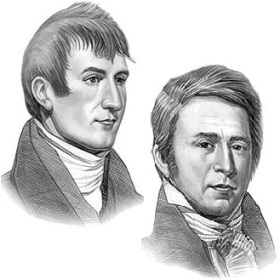|
The Journals
of Lewis and Clark: Dates October 25, 1805 - October
27, 1805
The following
excerpts are taken from entries of the Journals of Lewis
and Clark. Dates: October 25, 1805 - October 27, 1805
October
25, 1805
Friday, 25. We walked down with several of the Indians
to view the part of the narrows which they represented
as most dangerous: we found it very difficult, but,
as with our large canoes the portage was impracticable,
we concluded on carrying our most valuable articles
by land, and then hazarding the passage. We therefore
returned to the village, and after sending some of the
party with our best stores to make a portage, and fixed
others on the rock to assist with ropes the canoes that
might meet with any difficulty, we began the descent,
in the presence of great numbers of Indians who had
collected to witness this exploit. The channel for three
miles is worn through a hard rough black rock from fifty
to one hundred yards wide, in which the water swells
and boils in a tremendous manner. The three first canoes
escaped very well; the fourth, however, had nearly filled
with water; the fifth passed through with only a small
quantity of water over her. At half a mile we had got
through the worst part, and having reloaded our canoes
went on very well for two and a half miles, except that
one of the boats was nearly lost by running against
a rock. At the end of this channel of three miles, in
which the Indians inform us they catch as many salmon
as they wish, we reached a deep basin or bend of the
river towards the right, near the entrance of which
are two rocks. We crossed the basin, which has a quiet
and gentle current, and at the distance of a mile from
its commencement, and a little below where the river
resumes its channel, reached a rock which divides it.
At this place we met our old chiefs, who, when we began
the portage, had walked down to a village below to smoke
a pipe of friendship on the renewal of peace. Just after
our meeting we saw a chief of the village above, with
a party who had been out hunting, and were then crossing
the river with their horses on their way home. We landed
to smoke with this chief, whom we found a bold looking
man of a pleasing appearance, about fifty years of age,
and dressed in a war jacket, a cap, leggings and moccasins:
we presented him with a medal and other small articles,
and he gave us some meat, of which he had been able
to procure but little; for on his route he had met with
a war party of Indians from the Towahnahiooks, between
whom there was a battle. We here smoked a parting pipe
with our two faithful friends, the chiefs, who had accompanied
us from the heads of the river, and who now had each
bought a horse, intending to go home by land. On leaving
this rock the river is gentle, but strewed with a great
number of rocks for a few miles, when it becomes a beautiful
still stream about half a mile wide. Atfive miles from
the large bend we came to the mouth of a creek twenty
yards wide, heading in the range of mountains which
run S. S. W. and S. W. for a long distance, and discharging
a considerable quantity of water: it is called by the
Indians Quenett. We halted below it under a high point
of rocks on the left; and as it was necessary to make
some celestial observations, we formed a camp on the
top of these rocks. This situation is perfectly well
calculated for defence in case the Indians should incline
to attack us, for the rocks form a sort of natural fortification
with the aid of the river and creek, and is convenient
to hunt along the foot of the mountains to the west
and southwest, where there are several species of timber
which form fine coverts for game. From this rock, the
pinnacle of the round mountain covered with snow, which
we had seen a short distance below the forks of the
Columbia, and which we had called the Falls or Timm
mountain, is south 43° west, and about thirty-seven
miles distant. The face of the country on both sides
of the river above and below the falls is steep, rugged,
and rocky, with a very small proportion of herbage,
and no timber, except a few bushes: the hills, however,
to the west, have some scattered pine, white oak and
other kinds of trees. All the timber used by the people
at the upper falls is rafted down the Towahnahiooks;
and those who live at the head of the narrows we have
just passed, bring their wood in the same way from this
creek to the lower part of the narrows, from which it
is carried three miles by land to their habitations.
Both above and below, as well as in the narrows, we
saw a great number of sea-otter or seals, and this evening
one deer was killed, and great signs of that animal
seen near the camp. In the creek we shot a goose, and
saw much appearance of beaver, and one of the party
also saw a fish, which he took to be a drum-fish. Among
the willows we found several snares, set by the natives
for the purpose of catching wolves.
|

